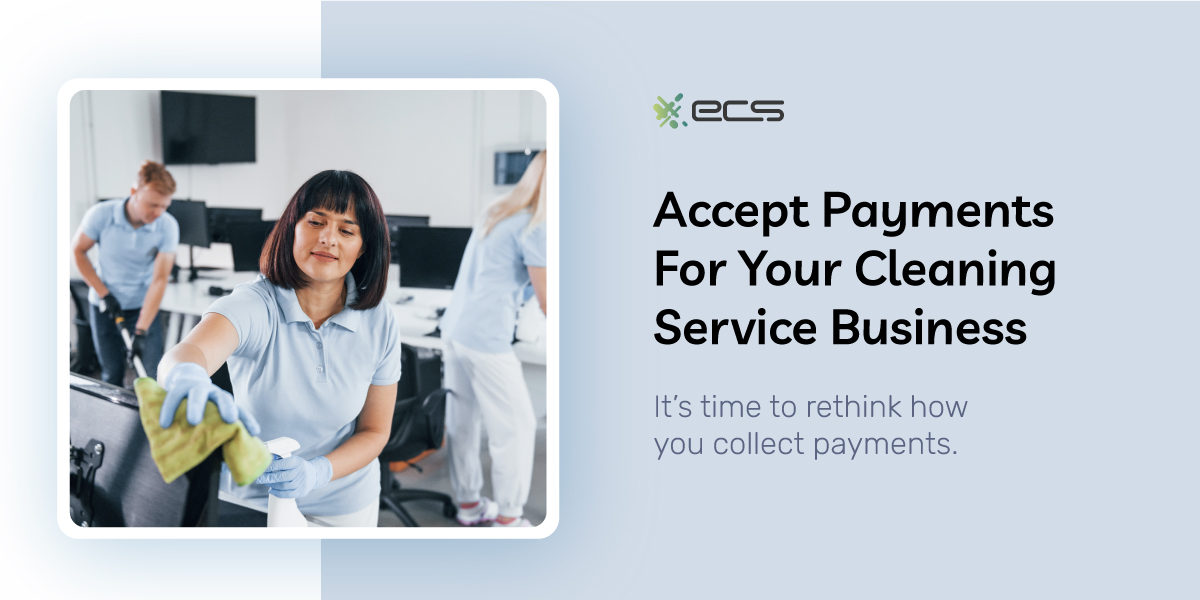Own a cleaning service business? Whether you do it solo or have a team of people, it’s time to rethink how you collect payments.
Cleaning Professionals: An Industry Overview
Industry analysts believe that as many as 2.4 million individuals in America have a cleaning job, and there are 875,000 cleaning businesses. However, this number may not be accurate because there may be far more individuals collecting cash payments “under the table” for their cleaning services.
Some cleaners are sole proprietors who want to start a house cleaning business. Others are employees or owners of a cleaning franchise. Franchises make up about 37% of the cleaning industry, servicing homeowners and 72% of businesses that outsource their cleaning.
Cleaning Services And The Unbanked
The prevalence of “unbanked” small businesses like a home cleaner (and/or their team) is arguably tied to other factors. According to the Economic Policy Institute, 50% of domestic workers (e.g., house cleaners) are noncitizens. Even including those who are naturalized and/or documented, 35% are immigrants.
These individuals can face more significant hurdles in becoming “banked.” They may rely on cash payments from potential customers. However, in most cases, nothing stops such individuals from getting banked and enjoying the financial services their customers use, such as plastic payment methods.
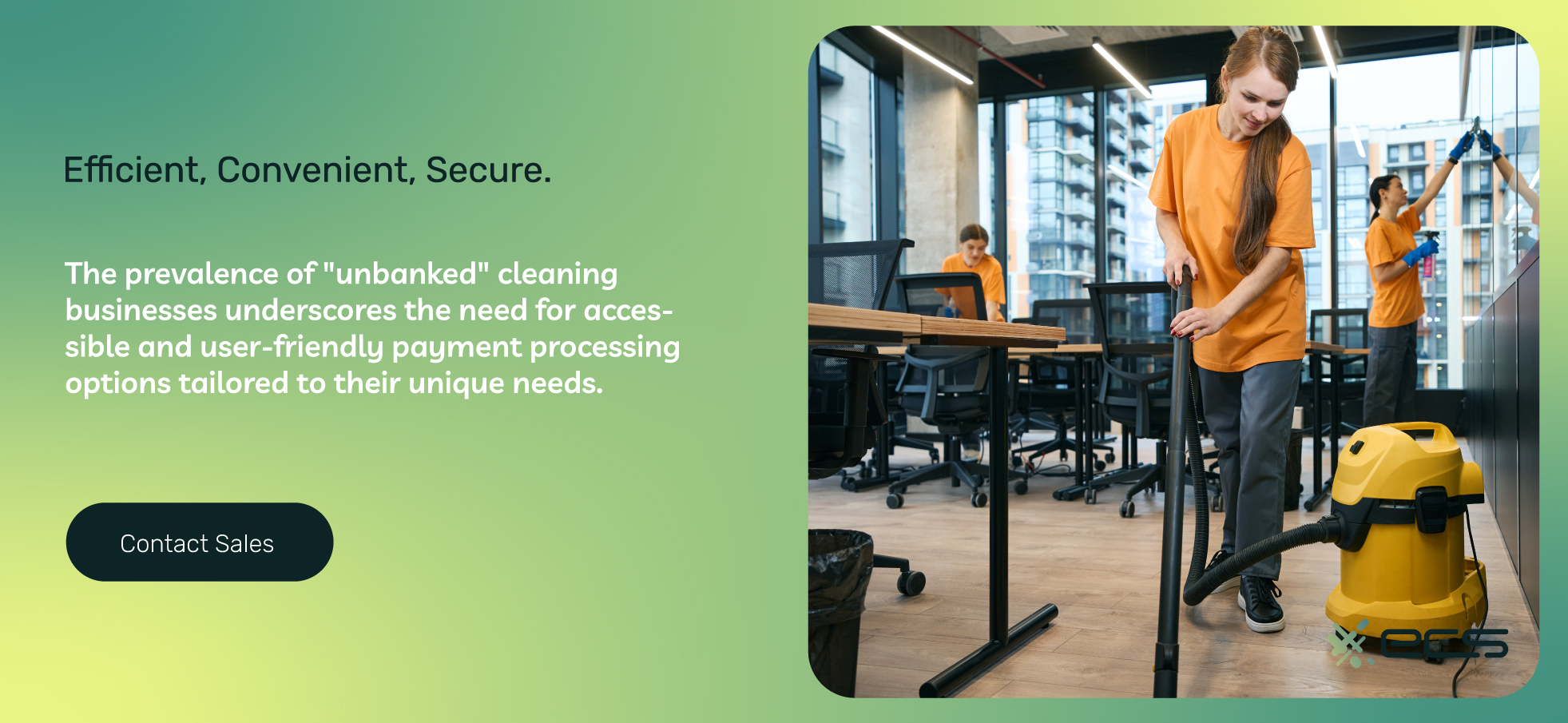
What Types of Cleaning Services Are Out There?
Cleaning professionals are the unsung heroes that keep life moving. Without them, things would get messy and fast. It’s difficult to pinpoint exact numbers (per the data above), but from what we know, a whopping 84% of cleaners work in the private sector. This could include private homes, hospitals, and hotels.
Around 13% work for the public sector, while 2% work in education. These janitorial service providers may be cleaning schools, libraries, police stations, civic buildings, and government offices. Usually, cleaning businesses in the public sector must win a government contract.
Cleaning can also be broken down into specialties. Some cleaners do a “clean everything” service for residential customers. There are window washers, carpet cleaners, organizers, car detailers, linen cleaners, restaurant kitchen cleaners, and dozens of other specialties like deep cleaning.
More Power To YOU
In America, 86% of cleaners are female, and of those women business owners, 46% are Latina. Industry studies have indicated that the overlap of these demographics may facilitate work-related abuse. This type of abuse would not be countenanced if a traditional employment paper trail existed.
For instance, cleaners may be overworked, underpaid, and asked to do tasks that fall outside the scope of their proposed duties. Becoming “banked” is about more than just collecting credit cards. Payment processing can legitimize a business and make it fit into a framework of respect and accountability.
Exploring The Pitfalls Of Cash Payments
We’ll talk about accepting credit cards. But first, let’s talk more about why you do not want to get paid cash for janitorial services or home cleaning.
The first problem is that cash is relatively easy to lose. And once it’s lost, it’s gone. You cannot return to the customer, tell them you lost the cash, and ask for more. Digital payments (e.g., credit and debit cards) eliminate this problem entirely.
Another issue with cash is that cash attracts crime. Cash-heavy businesses like gas stations and convenience stores are known to be “good” targets for criminals because there is something to steal.
Business owners often try to circumvent this problem by depositing money frequently and posting that employees have no access to the safe or that there is never more than $100 in change in the register.
Yet another issue with cash is the potential for customer haggling. This problem is more likely if you also do not issue receipts. And it’s likely that you’re not printing receipts if you’re not taking credit cards either. The result is that there may sometimes be disagreements over whether you were paid or not and if you were paid what you were owed.
Lastly, cash needs to be deposited or stored safely. This means frequent trips to the bank or the nearest ATM. For employees of your business without a car (and relying on public transport), this is another burden. If you are unbanked, this means storing cash at home, which once again brings us back to the crime issue.
What About Checks?
Some homeowners and business owners may want to give you checks. Check use has waned dramatically over the last few decades, so much so that nearly 60% of Americans have not written a check in the past month. However, some consumers (particularly homeowners or renters) still use checks for utility payments, taxes, and payments to contractors (e.g., cleaning professionals).
So, that said, there is a decent chance that clients will try to give you checks. This is a step up from cash in specific ways. Checks provide a paper trail. They are more challenging to lose and more complex for criminals to take. But checks can also be charged fees to cash or deposit them. And even if they don’t, you’ll still need to bring them to the bank.
Checks also have the additional danger of bouncing. When a customer hands you cash, you at least know that you can take that money to a bank. With a check, there is the possibility that the check will bounce if the client does not have enough funds in their account to cover it.
Is It Legal To Clean Houses For Cash?
It certainly is, just like it’s legal to collect cash tips and even be paid your wages in cash. Most employers issue paychecks or direct deposits instead of cash because it’s much easier to process the payroll that way (for some of the same reasons listed above).
However, if you are doing any kind of job for cash, that’s income you need to report. When you file your taxes, you put this cash flow onto your Form 1040 and subtract any business expenses (cleaning products, supplies, transportation costs, and other expenses). It is technically illegal to avoid reporting your cash wages.
This brings us to another problem. If you do not have a paper trail for your cash flow, pinpointing how much you make is next to impossible. While it’s unlikely that the IRS will audit you, it is still important to accurately report your income for your own sake.
Get A Grip On Your Cash Flow
If you ever want to apply for a significant personal loan like a mortgage, you must furnish proof of your income. There may be social welfare programs you want to apply for. Or, you may want to obtain a business loan to expand your cleaning service into a much larger operation.
You will have concrete numbers around your cash flow in all these cases. Collecting actual cash makes this next to impossible to obtain. However, processing credit and debit card payments makes it much more manageable. This is because every transaction is entered automatically into a ledger. This ledger can even be lined up against your expenses, making it easier to file your taxes.
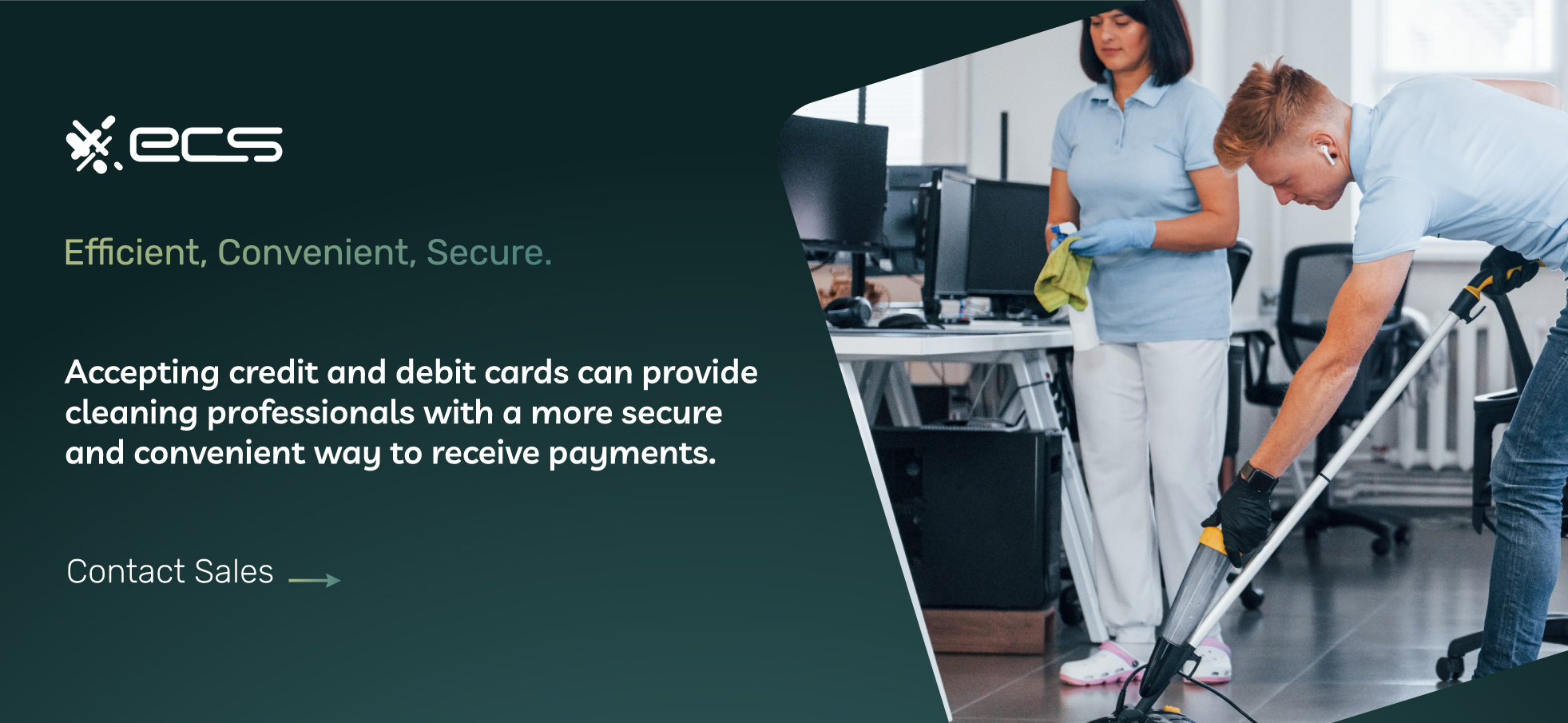
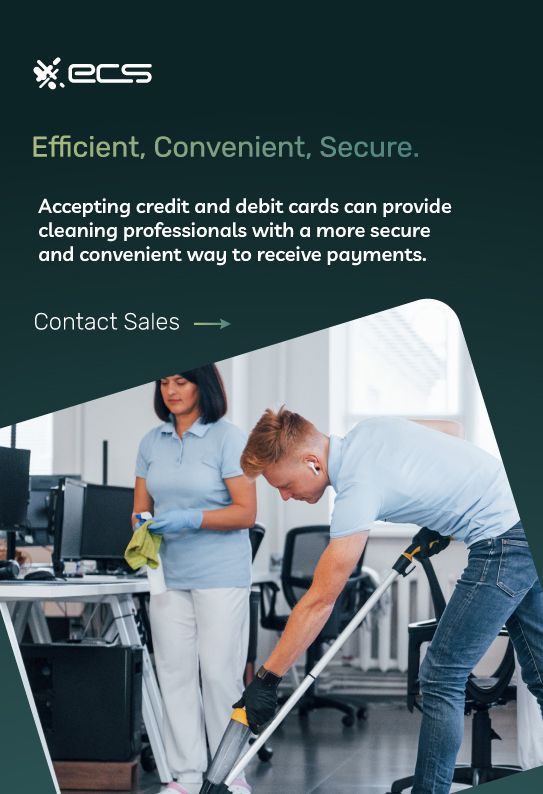
How Do I Accept Credit Cards For My Cleaning Business?
When you start a cleaning business, collecting credit cards might not be on your radar. You are probably more focused on getting clients, cleaning, and doing a good enough job to create word-of-mouth marketing. Most cleaners, especially home cleaners, operate their businesses more informally than other sole proprietors.
You might think accepting credit cards is outside of your abilities. After all, most in-person payments involve some sort of credit card terminal. You definitely don’t want to have to carry one of those around or pay for one.
Can’t Client’s Just Send Me Money
Indeed, you can collect payment with such P2P applications (Zelle, Venmo, PayPal, or Cash App). However, there are some pitfalls to each one.
Let’s first start with Zelle. Zelle payments go right into your bank account. There is little way to separate them from all the other transactions that accrue over the year.
When it comes time to figure out your income (for doing taxes or applying for a loan), it will take you hours, if not days, to isolate and add up the hundreds (or thousands) of Zelle transactions from your customers.
Another issue is that not all your customers are willing to use Zelle. If your clients are businesses, Zelle is probably out of the question. Suppose you are carpet cleaning and/or window cleaning for office clients. They will not Zelle you payment for this type of work. They prefer to send and receive invoices for B2B interactions.
What’s Wrong With PayPal and Venmo?
PayPal and Venmo also seem like good options. However, each one has its pitfalls. First, let’s start with PayPal issues: You will be charged 1.75% to withdraw money into your checking account as quickly as possible. Customers may say they’ll “PayPal” you later and forget. They may send it as a payment for “goods and services,” which means you’ll lose nearly 3%.
Venmo presents similar issues. Even worse, Venmo has legendarily bad customer service. If they lock your account for suspicious activity or any other issue occurs, there is no phone-based customer support. Email troubleshooting will take several days to a week to unfreeze your account.
Lastly, there is the same issue mentioned above about Zelle. Businesses do not use PayPal, Zelle, or Venmo money. If you are working with businesses (like restaurants, offices, or warehouses), you will need to “speak their language” regarding payments. Most of these businesses prefer to pay with credit cards (specifically business cards).
Forgotten Payments And Customer Experience
Let’s reiterate the above point about forgotten payments. Despite its many pitfalls, cash at least is a finalized transaction. Not so with P2P payments like Zelle, PayPal, and Venmo. Let’s say you are done cleaning a home. You’ve packed up the supplies and are on the way to your next address. You’re already late, and you’ve got to go.
The customer says they will Zelle you later. Then they forget. You’ll have to text them to ask for your money. Or you might forget entirely and not get paid. You simply cannot run a business like this, especially with a distracted customer base.
This problem (dropped payments) is eliminated when you accept credit card payments. The customer presents their card, the payment is completed, and the transaction is finalized. There is no cash to lose or have stolen and no dropped or forgotten payments.
So, How Do I Start Accepting Credit Cards?
You will need a credit card processing company to help you accept plastic payments. However, the good news is that you won’t need a huge credit card terminal like you see in stores. Payment processing companies these days offer mobile terminals that you can attach to phones or carry in your pocket.
A payment processor handles all the backend concerns of taking credit and debit card payments. They also provide customer service; you can call them if there are problems. If you have a customer-facing website, they can also create an online payment gateway for collecting payments remotely.
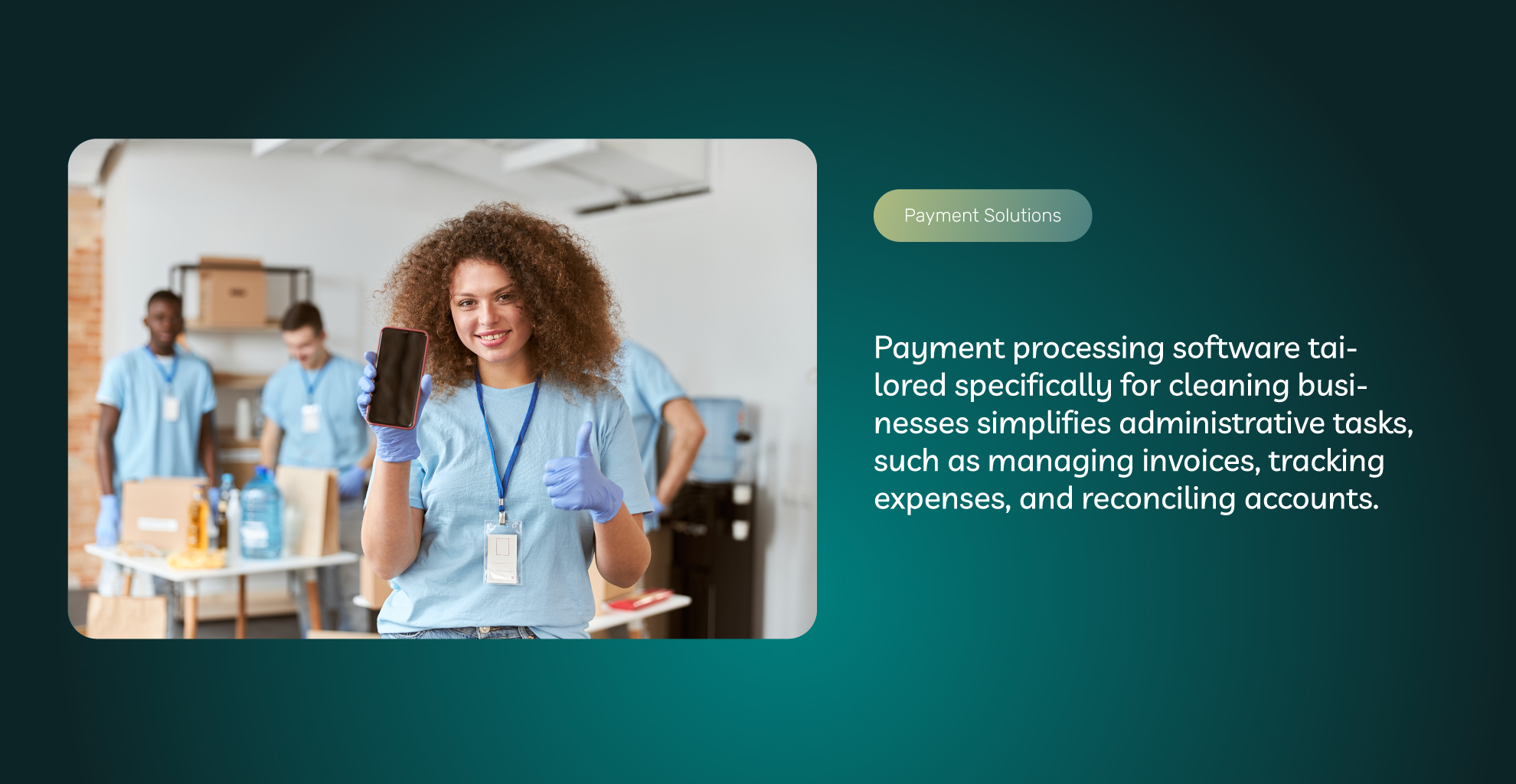
How To Invoice Your Cleaning Services
Another thing that a payment processor can help you with is cleaning billing. If you are dealing with business clients, they may prefer to receive and pay invoices. Invoicing is more complicated than accepting simple card payments. Invoicing must follow a specific process, where services are itemized and listed by price, and you provide contact information for both yourself and the client.
Businesses may expect that you’ll provide them with greater flexibility in terms of payment. For instance, many businesses prefer to have a timeframe to pay their invoice. Net-30 billing, for example, means the business has 30 days to pay.
A payment processor can help automate the billing and invoicing with your different clients, send reminders, and make sure all payments are received. They can provide a template for a cleaner or maid service invoice and provide cleaning service receipts. Everything about the invoicing process is set up for you so you can focus on cleaning.
House Cleaning Services Invoice
You can also use invoicing for homeowners. A residential cleaning/house cleaning invoice could list and itemize all the times you’ve cleaned a particular residence during that month. The client can then go online and pay their invoice.
This type of arrangement works particularly well for clients who are often not at home or who often need to dash off to pick up their kids from school. It also works very well if you have a client with multiple properties, such as someone who owns rentals or Airbnb properties.
Payment Processing Helps You Scale Your Business
You may be content to go solo for life (in terms of cleaning). But what if you want to scale your business? What if you want to bring some other people on board? Growth is the natural trajectory of any business. You can make more money if you have several teams working for you at one time.
Payment processing will help you make sure you’re getting paid for all that work. Cash payments could be skimmed or taken advantage of. For instance, some unscrupulous person on your team might charge a customer $200 when you’ve said to charge $150 (and then pocket the rest).
Alternatively, a team might forget to collect their payment, or the customer might forget to pay. It’s hard enough to track this down when it’s just you. What if you have five different teams under your name? Payment processing eliminates this difficulty.
House cleaning billing software or payment processing software will have a dashboard. This dashboard could be accessed from a computer or even your phone. It will let you see which bills have been paid and which haven’t. Since the payments are fixed and recorded digitally, nobody will be able to “skim” a little off the top.
Do You Pay Before Or After Cleaning Services?
Wouldn’t it be nice to get a cash advance when you need one or get paid beforehand? With payment processing, that is a possibility. House cleaning jobs that pay cash mean you can only collect payment after the job is done. However, if you accept card payments, there are ways to get paid before you even pick up a sponge, mop, or broom.
With a payment processor, customers can book an appointment and pay beforehand. New customers may be reluctant to do this, but existing customers will likely have little aversion to booking an appointment and paying up front.
This means, of course, that your payment processing must integrate with some booking software. No problem. A payment processor can take care of that as well. Imagine how great it would be to have your week booked up and paid for before Monday. That’s what things can look like if you accept plastic payments and integrate your payments with booking software.
House Cleaning Subscription Services
Many consumers have become partial to a B2C relationship called subscription services. You may subscribe to several services like Amazon Prime and Netflix. Why not make your business a cleaning service subscription?
Subscription services are a great way to automate payments to build consistent cash flow, with recurring payments, especially since your clients will probably want you to come regularly anyway. Let’s look at an example.
Subscription Services Can Help You Retain Cash Flow
Suppose a customer needs you to clean their home or office twice a month. They pay you in cash after each job. However, there is a scheduling conflict one month, and they cancel one of your dates. Now, 50% of your income from that client is out the window.
Now, suppose you had automatic payment software set up to collect recurring charges for that client. The “option” to cancel a cleaning that hasn’t been paid for yet is off the table. The customer pays the same amount every month. There is more motivation for said customer to reschedule the appointment they’ve paid for rather than drop it altogether.
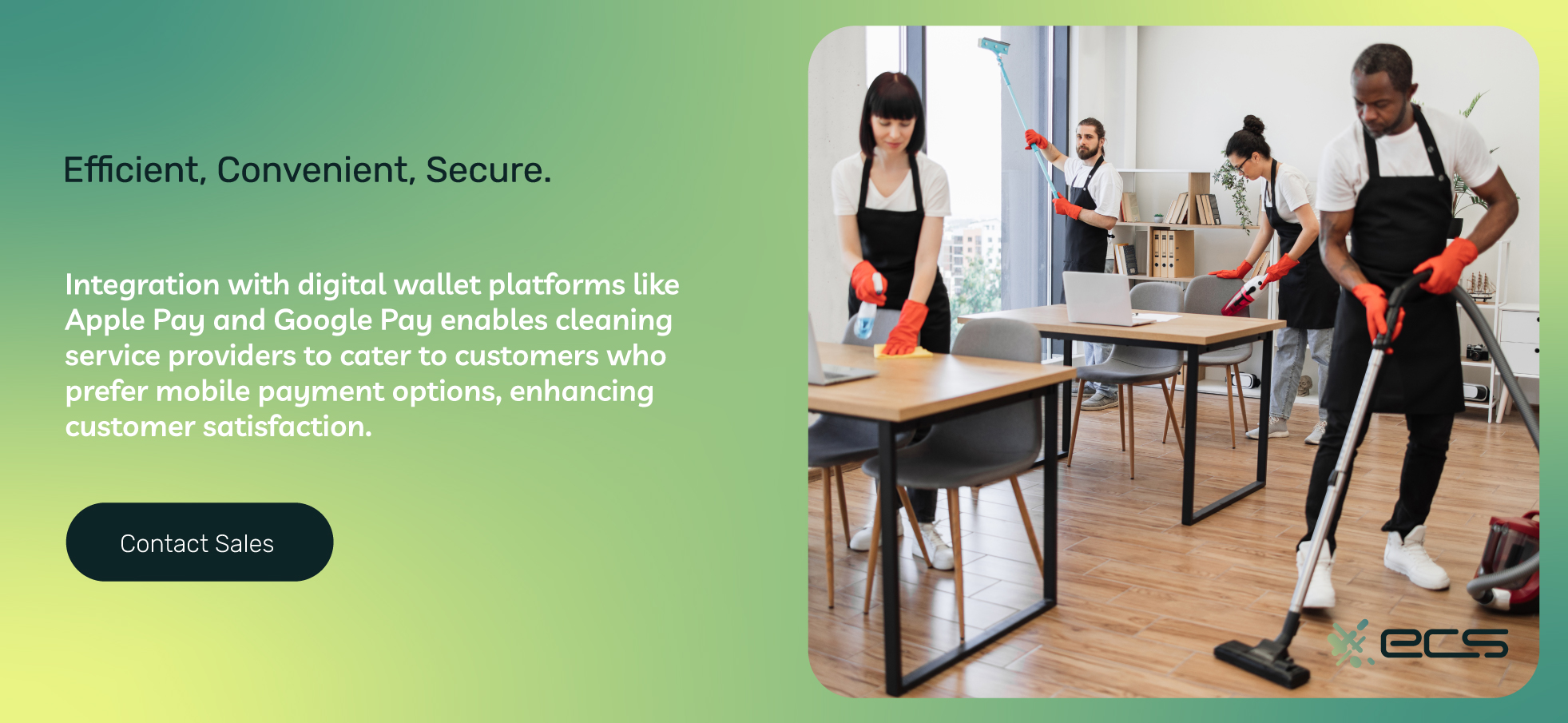
How To Get House Cleaning Clients Versus Business Clients
Your “house cleaning card” is how well you clean a home, pricing, and service. Clients hate sloppy work and when cleaners throw out things that aren’t garbage (e.g., socks and small toys from under the couch). Care and attention to detail are your calling card.
This is how to get residential cleaning clients. But this strategy (good service, winning smile) is simply not enough for business clients. Want to know how to get cleaning contracts with banks? Hospitals? Hotels? Restaurants? You need to operate your business.
That means having business processes in place. One core business process is collecting payments professionally. And that means having a payment processor to take debit cards, credit cards, and ACH transfers. ACH transfers are bank-to-bank payments like payrolls (not to be confused with Zelle transfers).
Accepting Payments For Cleaning Services Mop-Up
It’s time to do a final wash and dry. It’s all well and good if you want to cash, check, or Zelle for cleaning homes. However, all these forms of payment have dangers and pitfalls. And perhaps more importantly, they do not allow you to scale your business or win bigger clients.
A payment processor can not only help you take payments, they can provide side services like a maid service contract template with terms and conditions. They can allow you to collect up front home services payments. They provide invoicing software to send invoices and provide house cleaning receipts. Additionally, they can provide simple accounting of your cash flow.
Once upon a time, you might have Googled something like “how to start a cleaning service with no money.” You might wonder how to accept credit and debit cards on your budget. Thankfully, it’s a lot easier and less expensive than you think. To get started, fill out the contact form below or give us a call. We’d love to hear from you and learn about your business.
Frequently Asked Questions About Accepting Payments For Cleaning Service Businesses
Cash is easy to lose, can attract crime, may lead to customer haggling, and needs to be deposited or stored safely, resulting in frequent trips to the bank. All of these factors into why businesses should avoid accepting payment in cash. Transitioning to digital payments like credit or debit cards eliminates these issues and brings accountability to your business.
Checks can incur fees for cashing or depositing in the bank, and more importantly, there is a risk of a check bouncing if the client lacks sufficient funds. Exploring alternative payment methods, such as credit cards, can offer a more secure solution for your payments.
Yes, cleaning houses for cash is legal, but you must report cash income when filing taxes. Accurately reporting your income not only complies with legal requirements, but can also help you to obtain personal or business loans and participate in social welfare programs.
Accepting credit cards for your cleaning business is easier than you might think. Payment processing companies offer mobile terminals that can be attached to phones or carried in your pocket. These companies handle the backend of credit and debit card payments, provide customer service, and may even create an online payment gateway for remote transactions for a simplified payment processing solution for cleaning service businesses.
